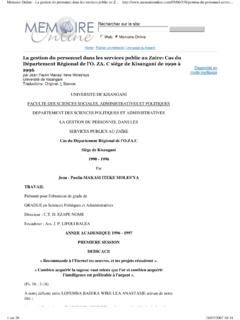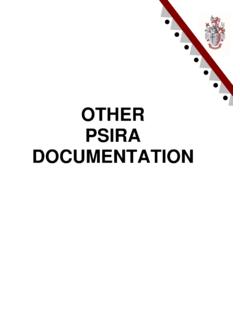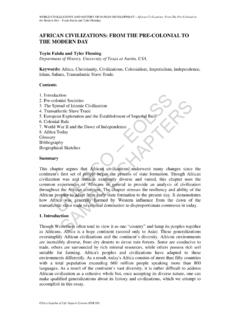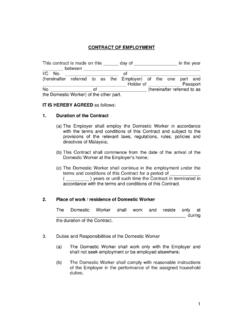Transcription of BANTU PHILOSOPHY PLACIDE TEMPELS - …
1 1 BANTU PHILOSOPHY by PLACIDE TEMPELS Texte int gral, digitalis par Lies Strijker et pr sent par le Centre Aequatoria Full text, digitalised by Lies Strijker and presented by the Centre Aequatoria Notes on the digitalisation and presentation: 1. We have used the second edition of the English translation as published by Pr sence Africaine, Paris, 1959. The first edition was published in 1952. See TEMPELS s bibliography on 2. The text was digitalised in September 2006 for the website of the Centre Aequatoria by Lies Strijker.
2 4. For technical reasons we have not indented the first lines of paragraphs. Bold, italic, s p r e a d and other font types are reproduced as such in our digital version. 5. The footnotes are reproduced at the end of the page where they appeared in the text. Original page numbers appear between square brackets and precede the page in question. Copyright: On several occasions, the Centre Aequatoria contacted Pr sence Africaine requesting permission to reproduce the text digitally. Our inquiries and requests have remained unanswered until today.
3 We reproduce the text pending reaction from PA. Honor Vinck, November, 2006 Remarques sur la pr sentation et la digitalisation: Nous avons utilis la seconde dition de la traduction anglaise, publi e par Pr sence Africaine, Paris, 1959. La premi re dition date de 1952. Voir la bibliographie de TEMPELS sur 2. Le texte a t digitalis en septembre 2006 pour le site du Centre Aequatoria, par Lies Strijker. 4. Pour des raisons techniques nous n'avons pas suivi le renforcement de la premi re ligne des paragraphes.
4 Les textes en gras, italique, c a r t et autres ont t rendus comme dans le texte. 5. Les notes infrapaginales sont reproduites la fin de la page o elles se trouvent dans le texte. La pagination de cette dition a t mentionn e entre crochets [ ] et pr c de le texte de la page en question. Copyright : Nous avons contact plusieurs fois l' diteur, sans r action de sa part. Honor Vinck, novembre 2006 2 [Cover] [p. 1: empty] [p. 2] IMPRIMI POTEST Kanzenze, 12-2-1952 P. Simeon, Sup.
5 Reg. IMPRIMATUR Luabo-Kamina, 30-5-1952 +VICTOR PETRUS KEUPPENS Vic. Ap. de Lulua [3] BANTU PHILOSOPHY by The Revd. Father PLACIDE TEMPELS (Translated into English from "La Philosophie Bantoue" the French Version by Dr. A. Rubbens of Fr. TEMPELS ' original work. The Revd. Colin King, Translator.) With a Foreword to the English Edition by Dr Margaret Read, D., , formerly Professor of Education and Head of the Department Of Education in Tropical Areas, The University of London Institute of Education.
6 IMPRIMATUR VICTOR PETRUS KEUPPENS Vic. Ap. de Lulua Luabo-Kamina, 30-5-1952 Pr sence Africaine 42, rue Descartes-Paris [4] Copyright by Pr sence Africaine, 1959 3 [no page number] [verso of the picture] Parade-axe. Wooden-handle. Plate in wrought iron. Hgt. cm. 4 [5] Rev. PLACIDE TEMPELS BANTU PHILOSOPHY 5 [7] Foreword to the English Translation The Rev. Colin King has, in this translation of Father TEMPELS ' study of BANTU PHILOSOPHY , conferred a great benefit on those students of African life and thought who use the English language for reading.
7 Ever since I saw the French edition published by Lovania in 1945, I have recommended the study to all who could use it in French. I have memories, too, of more than one African or Sudanese or Chinese student, who did not read French, sitting beside an English fellow student in the little seminar room under the roof, while they worked together on the ideas put forward by Father TEMPELS with such intimate knowledge and eloquence. Every year, in the seminar to which Mr. King refers, someone raises a question touching on the philosophic thought of African peoples.
8 When they are referred to Father TEMPELS ' study, there has often been dismay because it has only been available in French. Mr. King himself, as he says in his Translator's Note, worked on an English translation for his own continuous use and very generously made it available for use by others in the Department in which he holds at present a post as lecturer. It was clear, however, that for the English speaking world there was a great need to have access to this study, and all of us who have made use of it in the past will welcome the fact that an English edition is now available.
9 MARGARET READ Professor of Education. Head of the Department of Education in Tropical Areas, University of London Institute of Education. August, 1953. [8] NOTE by the English Translator. "La Philosophie Bantoue" was first published by Lovania at Elizabethville, in the Belgian Congo, in 1945, and was a French translation made by Dr. A. Rubbens. Copies of this version of the work became very difficult to obtain because those who had been able to snap them up in the short time during which they were available were mostly scholars who constantly needed their copies for their own use or for the use of their pupils.
10 To some extent this situation was relieved by the publication by De Sikkel in Antwerp of the original Dutch text and of a revised French translation, also by Dr. A. Rubbens, in the Collection Pr sence Africaine in Paris. It was my original intention merely to make a private translation for my own edification and for consultation by students in the Colonial Department (now the Department of Education in Tropical Areas) of the Institute of Education at London University, where my introduction to the work in Dr.










